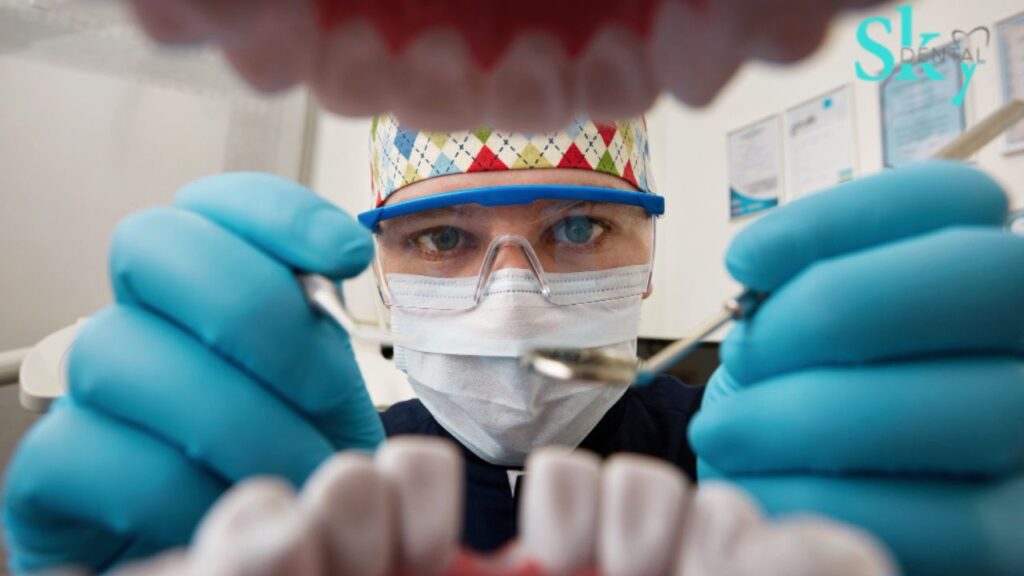You may have heard your dentist refer to “The Rule of 7” but what does that really mean? Is it a secret dental formula? Not really. The Rule of 7 is simply a guideline that can give both dentists and parents a glimpse into the course of their child’s oral development and subsequently the dental care they may need. It is a valuable guide that connects a child’s age to important milestones in dental development and care, so we at Sky Dental, the top dental clinic in Vijayawada, will break it down.
What is the Rule of 7?
The Rule of 7 is based on this idea that every 7 years of a child’s life they experience a development change to their teeth or oral care needs. It is a good reminder for both dental practitioners and parents to recognize what to expect and when. The “rule” is not written in stone but offering an approximate timeframe to chart a child’s development.
Age 7: First Visit to the Orthodontist
By the time a child reaches 7 years most children will have a mixture of baby (primary) teeth and permanent teeth. This is the ideal time for an orthodontist (dentist that specializes in straightening teeth) to evaluate your child’s growth and development regarding their bite and jaw.
Even if braces aren’t necessary at this point, an early evaluation can identify concerns such as overlap and crowding, misalignment of teeth and jaws, and even larger problems in development.
At this stage, a child usually has first molars and front teeth that are permanent. This is an early visit for an orthodontist, who can get to know how the remainder of the child’s teeth will come into place, or whether early intervention will be necessary.
Age 14: Most Permanent Teeth are in Place
Around age 14, children have most of their permanent teeth (excluding wisdom teeth). Usually, with this age group, it could also be a time where many children start to order brackets if indicated. By this time dental hygiene habits have improved sufficiently so that most children will be brushing and flossing solely, however parents will want to monitor their teen’s habitual diet in order to decrease the risk of cavities, gum problems, and plaque accumulation.
It is important for dentists to assess bite alignment, jawbone growth, and passive growth to determine proper development of teeth. If there are issues with crowding, or the child has not developed well, this is the time frame where orthodontic treatment may be determined (braces, retainers, etc).
It is still important to continue with maintaining dental cleanings and regular checkups at least every six months, to help mitigate the risk of maintaining overall oral health. Our dental clinic in Vijayawada offers comprehensive care during this stage of development.
Age 21: Wisdom Teeth Evaluation
The last “7” in the Rule of 7 occurs at approximately age 21. By the time a person walks into the office at age 21, the last of the back teeth, or third molars (all too commonly called “wisdom teeth”) may have erupted or will certainly be getting ready to. Often, young adults have issues with these teeth coming in — pain, crowding, infection, etc. All due to the fact there just isn’t any room for these very unhelpful teeth to come in properly.
Dentists normally take X-rays of wisdom teeth during the late teens and early 20s for the purpose of evaluating their eruption status. Dentists will consider both the position of these wisdom teeth and how they are growing in when deciding whether to remove them early (to avoid any troubles down the road).
Wisdom teeth removal is one of the most common procedures dentist do in their office, and having it done at the right time can lessen the post-operative pain, swelling, and potential future difficulties with dental care moving forward. At Sky Dental, a trusted dental clinic in Vijayawada, we specialize in comfortable and safe wisdom tooth extractions.
Why is it Important
The Rule of 7 allows parents and patients to take control of their dental appointments. It provides a gentle reminder to parents and patients to:
- Have the child’s first ortho check done by age 7
- Follow the child through the full eruption of their permanent teeth by age 14
- Start evaluating wisdom teeth around age 21
Not every child will adhere to the timeline, but it is a basic way to be proactive about your oral health care and identifying potential problems in advance. By following the Rule of 7, you can assist a child you care about in developing a healthy, confident smile for a lifetime.


